"Carousel is a colorful film that takes us on today's merry-go-round through an excellent editing job and the use of music. This 3 1/2 minute work of art is by Louis Grenier of Chicago" PSA Journal, Nov. 1969, 57.
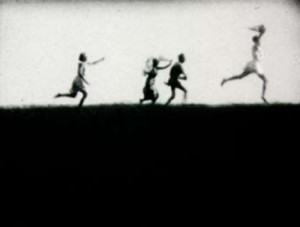
"Combines ancestral memory with reincarnation when the main character falls asleep, sees nymphs dancing in the same landscape hundreds of years in the past, and confronts his previous incarnation herding sheep and wearing fur." UC Berkeley Library.
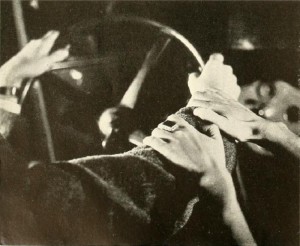
"The producers of 'Chronicle' must be commended for a novel treatment. They employed the hands only to show the life of a boy from his third birthday until maturity. Into this novel treatment they spun a story of the boy's downfall until he is found guilty of murder and is incarcerated. All of it was interior and was well photographed." American Cinematographer, Jan. 1936, 40.
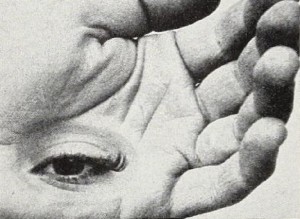
"Robert Fels and his associates have made in Cine Whimsy a sound motion picture unlike anything that has seen the screen previously. Its plot is based on the literal picturization of figures of speech and, when the characters in this movie "lose their heads," they actually do! Similarly, when the heroine "hits the ceiling," she does just that and, when the hero "pulls the wool over her eyes," he does so with the aid of a ball of yarn. We could go on citing this kind of thing indefinitely without revealing the picture's true quality, which lies in a surrealist treatment, always ingenious and sometimes fantastic. The priest who rises from the cactus to "hitch" the headless couple who are hauling a cart on a barren road represents the kind of imagery that is typical of the film. The sound track is a brilliant combination of commentation and "fake" lip synchronism. Mr. Fells conceived and directed the picture; Newell Tune filmed it, and Norman Johnson collaborated on the shooting script. Mr. Tune's trick work is among the best yet produced on 16mm." Movie Makers, Dec. 1942, 507-508.
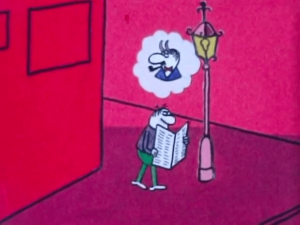
Film experimental de animación que cuenta una pequeña historia de infidelidad conyugal.
Experimental animation film that tells a short story about marriage infidelity.
"A five minute abstract film using live action, slow motion and shots showing the interplay of lights on coloured paper. Although the film was silent, its accompanying gramophone record married so well that the film was perceived as a sound film" ("McLaren and Grierson: Intersections").
avant-garde documentary with sound
"doc. a fantasia"/avant-garde documentary
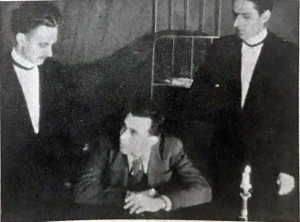
From the eponymous novella by Edgar Allan Poe
"II cuore rivelatore, realizzato da Alberto Mondadori, collaboratore Mario Monicelli, scenografia di Alberto Lattuada, operatore Cesare Civita; da un racconto di Edgar Allan Poe. lnterpreti Giuseppe Pedrini, Giuliano Carta. Abbiamo accennato tempo fa ad un film sperimentale americano sullo stesso soggetto, dovuto a R. P. Cobb. Interessante appare iI confronto con questo di Mondadori; in definitiva quello appare più surrealista, questo e invece più incisivo e reale preoccupandosi piuttosto Mondadori di creare l'atmosfera allucinata con uso non eccessivo di puri espedienti tecnici; ne consegue una maggior chiarezza nel racconto cinematografico, che procede abbastanza sostenuto anche per la buona interpretazione. Il regista non ha rinunciato tuttavia a quegli espedienti tecnici, come sovrimpressioni, ma ne ha usato in modo conveniente, senza esagerazioni . E' infine da tener presente l'intendimento di tentare nel campo della produzione italiana a passo ridotto, un genere diverso da i consueti."
"II cuore rivelatore (The Tell-Tale Heart), directed by Alberto Mondadori, with the collaboration of Mario Monicelli, set design by Alberto Lattuada, cameraman Cesare Civita, based on a story by Edgar Allan Poe. Some time ago, we mentioned to an American experimental film on the same subject by R. P. Cobb. Comparing it with this of Mondadori proves interesting; ultimately, that one appears more surrealist, while this one is instead more incisive and real since Mondadori concerns himself with creating the hallucinated atmosphere through a not excessive use of pure technical expedients; a greater clarity in the cinematographic story follows, which moves forward in a sustained enough fashion also for the good acting. The director has not abandoned himself to those technical expedients, such as superimpositions, but he has used them in a suitable way, without exaggerations. It is important, finally, to keep in mind the intention to try in the field of small-guage Italian production, a different genre from the usual."
—Il Ventuno 28 (Review of the G.U.F. of Venice), May 1935
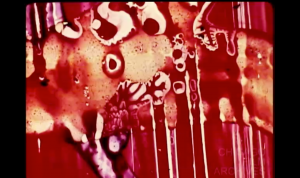
"An amateur experimental film made by Sol Falon and distributed by the Society of Amateur Cinematographers (SAC)." Chicago Film Archives
Total Pages: 16